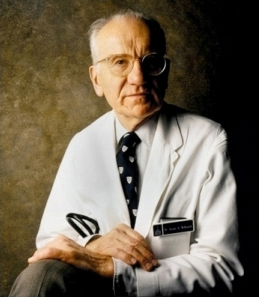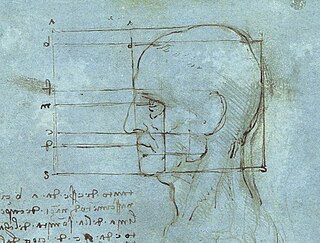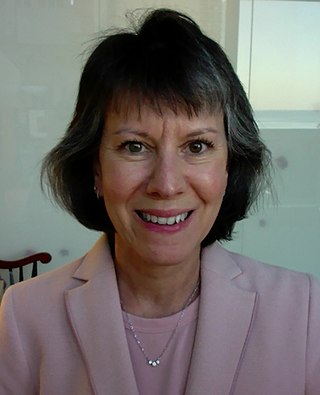
Victor Almon McKusick was an American internist and medical geneticist, and Professor of Medicine at the Johns Hopkins Hospital, Baltimore. He was a proponent of the mapping of the human genome due to its use for studying congenital diseases. He is well known for his studies of the Amish. He was the original author and, until his death, remained chief editor of Mendelian Inheritance in Man (MIM) and its online counterpart Online Mendelian Inheritance in Man (OMIM). He is widely known as the "father of medical genetics".

A benign tumor is a mass of cells (tumor) that does not invade neighboring tissue or metastasize. Compared to malignant (cancerous) tumors, benign tumors generally have a slower growth rate. Benign tumors have relatively well differentiated cells. They are often surrounded by an outer surface or stay contained within the epithelium. Common examples of benign tumors include moles and uterine fibroids.

Janet Davison Rowley was an American human geneticist and the first scientist to identify a chromosomal translocation as the cause of leukemia and other cancers, thus proving that cancer is a genetic disease. Rowley spent the majority of her life working in Chicago and received many awards and honors throughout her life, recognizing her achievements and contributions in the area of genetics.

Cowden syndrome is an autosomal dominant inherited condition characterized by benign overgrowths called hamartomas as well as an increased lifetime risk of breast, thyroid, uterine, and other cancers. It is often underdiagnosed due to variability in disease presentation, but 99% of patients report mucocutaneous symptoms by age 20–29. Despite some considering it a primarily dermatologic condition, Cowden's syndrome is a multi-system disorder that also includes neurodevelopmental disorders such as macrocephaly.

Medical genetics is the branch of medicine that involves the diagnosis and management of hereditary disorders. Medical genetics differs from human genetics in that human genetics is a field of scientific research that may or may not apply to medicine, while medical genetics refers to the application of genetics to medical care. For example, research on the causes and inheritance of genetic disorders would be considered within both human genetics and medical genetics, while the diagnosis, management, and counselling people with genetic disorders would be considered part of medical genetics.

Bannayan–Riley–Ruvalcaba syndrome (BRRS) is a rare overgrowth syndrome and hamartomatous disorder with occurrence of multiple subcutaneous lipomas, macrocephaly and hemangiomas. The disease is inherited in an autosomal dominant manner. The disease belongs to a family of hamartomatous polyposis syndromes, which also includes Peutz–Jeghers syndrome, juvenile polyposis and Cowden syndrome. Mutation of the PTEN gene underlies this syndrome, as well as Cowden syndrome, Proteus syndrome, and Proteus-like syndrome, these four syndromes are referred to as PTEN Hamartoma-Tumor Syndromes.
Harry Ostrer is a medical geneticist who investigates the genetic basis of common and rare disorders. In the diagnostic laboratory, he translates the findings of genetic discoveries into tests that can be used to identify people's risks for disease prior to occurrence, or for predicting its outcome once it has occurred. He is also known for his study, writing and lectures on the origins of the Jewish people.

Alan Edward Guttmacher is an American physician who was the director of the National Institute of Child Health (NICHD), one of the 27 institutes and centers that comprise the National Institutes of Health (NIH). In that capacity, he oversaw the institute’s activities as the focal point at the NIH for research in pediatric health and development, maternal health, reproductive health, intellectual and developmental disabilities, and rehabilitation medicine, among other areas.
Genomic counseling is the process by which a person gets informed about his or her genome often in the setting of elective genetic and genomic testing. In contrast to genetic counseling, which focuses on Mendelian diseases and typically involves person-to-person communication with a genetic counselor or other medical genetics expert, genomic counseling is not limited to currently clinically relevant information. It is often based on genomic information that is of interest for the informed person, such as increased risk for common complex disease that has actionable components, genetically determined non-disease related traits, or recreational forms of information and genetic genealogy data. An individual's response to certain medications/drugs based on their pharmacogenomic profile may be provided.

Olufunmilayo I. Olopade born in the year 1957, is a Nigerian hematology oncologist, Associate Dean for Global Health and Walter L. Palmer, Distinguished Service Professor in Medicine and Human Genetics at the University of Chicago. She also serves as director of the University of Chicago Hospital's Cancer Risk Clinic.
The Genomic Medicine Institute at the Cleveland Clinic is an inter-disciplinary institute and department that focuses on patient care, patient-oriented research, and outreach and education in personalized healthcare guided by genetics and genomics. It is located in the Center for Genomics Research Building in the Cleveland Clinic, in Cleveland, Ohio, United States of America.

In human anatomy, the head is at the top of the human body. It supports the face and is maintained by the skull, which itself encloses the brain.
Sir Bruce Anthony John Ponder FMedSci FAACR FRS FRCP is an English geneticist and cancer researcher. He is Emeritus Professor of Oncology at the University of Cambridge and former director of the Cancer Research UK Cambridge Institute and of the Cancer Research UK Cambridge Cancer Centre.

Yusuke Nakamura is a Japanese prominent geneticist and cancer researcher best known for developing Genome-Wide Association Study (GWAS). He is one of the world's pioneers in applying genetic variations and whole genome sequencing, leading the research field of personalized medicine.

John M. Opitz was a German-American medical geneticist and professor at the University of Utah School of Medicine. He is best known for rediscovering the concept of the developmental field in humans and for his detection and delineation of many genetic syndromes, several now known as the "Opitz syndromes" including Smith–Lemli–Opitz syndrome (SLOS), Opitz–Kaveggia syndrome (FGS1), Opitz G/BBB syndrome, Bohring–Opitz syndrome, and other autosomal and X-linked conditions. He is founder of the Wisconsin Clinical Genetics Center, the American Journal of Medical Genetics, and was a cofounder of the American College and American Board of Medical Genetics.
Elective genetic and genomic testing are DNA tests performed for an individual who does not have an indication for testing. An elective genetic test analyzes selected sites in the human genome while an elective genomic test analyzes the entire human genome. Some elective genetic and genomic tests require a physician to order the test to ensure that individuals understand the risks and benefits of testing as well as the results. Other DNA-based tests, such as a genealogical DNA test do not require a physician's order. Elective testing is generally not paid for by health insurance companies. With the advent of personalized medicine, also called precision medicine, an increasing number of individuals are undertaking elective genetic and genomic testing.
Mary Armanios is Professor of Oncology, Genetic Medicine, Pathology and Molecular Biology, and Genetics at Johns Hopkins University School of Medicine and the Director of the Telomere Center at Johns Hopkins University. Her research focuses on the role of telomeres in disease.

Elizabeth M. McNally is an American human geneticist and cardiologist. She is the Elizabeth J. Ward Chair and director of the Center for Genetic Medicine at Northwestern University's Feinberg School of Medicine.
Clair A. Francomano is an American medical geneticist and academic specializing in Ehlers–Danlos syndromes. She is Professor of Medical and Molecular Genetics at Indiana University.
Elaine H. Zackai is a Professor of Pediatrics, Director of Clinical Genetics, and the Director of the Clinical Genetics Center at Children's Hospital of Philadelphia (CHOP).











